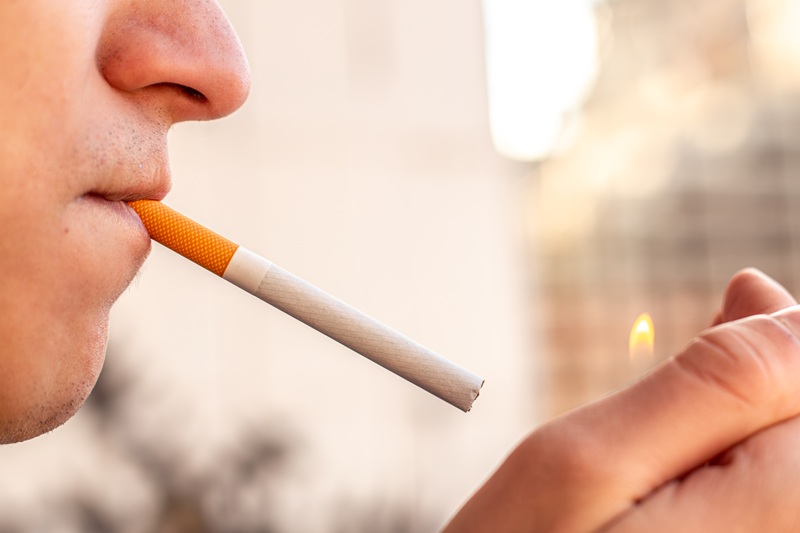The Science Behind How Smoking Affects Your Teeth and Gums

Most people know that smoking is harmful to the lungs and heart. However, what often gets overlooked is how much it can damage your dental health as well. Yes, smoking also affects your teeth and gums, resulting in bad breath, yellow stains, or in more serious cases, gum disease and tooth loss.
This shows that the effects of smoking on your oral health are significant and long-lasting.
So, what does smoking do to your teeth and gums? Let’s break it down and look at the science behind how cigarette smoke affects the health of your mouth.
How Smoking Harms Your Teeth and Gums
1. Toxins in Cigarette Smoke Damage Gum and Bone
Cigarettes are composed of many toxic chemicals that can be harmful for your overall health, even your dental. When you smoke, toxic chemicals, including nicotine, fill your mouth and coat your teeth and gums, which does not only stay on the surface of your teeth.
What many people do not know is that these toxic chemicals also seep into the gum tissue and bloodstream, weakening the support structure that holds your teeth in place. While only 1-1.5 mg of nicotine content is absorbed by a person from one cigarette stick, it can still pose significant issues to your oral health, especially when they are already frequently smoking.
Over time, smoking reduces the blood flow in your gums, damaging the tissues and bones that anchor your teeth, which makes it much harder for your mouth to fight infection or heal from injury.
2. Smoking Increases the Risk and Severity of Gum Disease
Does smoking affect teeth and gums?
Yes, especially when it comes to gum disease.
Smoking is one of the biggest risk factors for gum disease (also called periodontal disease). Here’s how it happens:
- Cigarette toxins weaken your immune response.
- Bacteria build up along the gumline.
- Your body struggles to fight off the infection.
- The bone around your teeth starts to dissolve.
Even worse, if you already have gum disease while also smoking, treatment becomes much less effective. The healing process slows down because the damaged tissue is not getting the oxygen and nutrients it needs.
3. Dry Mouth and Poor-Quality Saliva
Smoking does not stop affecting your teeth and gums because it can also change your saliva quality, too.
Is saliva quality important for oral health as well?
Yes, it is.
Having healthy saliva helps protect your teeth by washing away food, neutralising acids, and carrying minerals that strengthen enamel.
But smoking dries out the mouth and reduces the quality of your saliva, which puts smokers at a higher risk of oral problems like tooth decay, gum infections and even bad breath.
Having a dry mouth may not seem like a big deal at first, but over time, it can actually lead to serious dental problems.
4. Stained and Discoloured Teeth
One of the most visible signs of smokers’ teeth is staining. The tar and nicotine in cigarettes quickly stick to tooth surfaces, turning them yellow or brown.
Even with good brushing habits, cigarette stains can be stubborn. Over time, they build up and dull your smile, and smokers are also more likely to experience plaque build-up, which adds to the discolouration.
While professional cleaning can help, the stains will keep returning as long as smoking continues.
5. Increased incidence of mouth cancers
A frightening fact of smoking is that many of the toxins in cigarette smoke are extremely carcinogenic. The more you smoke, the more the skin inside your mouth is bathed in these carcinogenic toxins. This puts smokers at a much higher risk of developing oral cancer. For smokers it is even more important that they maintain regular dental check ups. At Whitehorse dental, our dentists will always do a oral cancer screening each time they check your teeth, ensuring that the skin inside your mouth is a normal colour, consistency and texture.
Vaping: Is It Any Better?
Some people think and turn to vaping as a “healthier” alternative to smoking, but the truth is more complicated. Although research on vaping is still developing, early findings show that it may cause similar damage to oral tissues:
- It can dry out the mouth and reduce saliva.
- It may irritate the gums and trigger inflammation.
- It often contains unknown chemicals that aren’t clearly listed on the packaging.
While vaping does not produce tar like traditional cigarettes, it still exposes your mouth to harmful substances, poses the same risks as that of traditional cigarettes and the long-term effects are not yet fully understood.
The safest thing to breathe is plain, clean air. Vaping should not be seen as a harmless substitute for smoking.
Can Dental Treatments Help Reverse the Damage?
The good news is that some effects of smoking can be managed or improved with the help of your dentist. At Whitehorse Dental, we help patients with:
- Gum disease treatment
- Professional teeth cleaning and stain removal
- Dry mouth solutions
- Tooth replacement options (like implants or dentures if needed)
However, for our dentists at Whitehorse Dental, treatments work best when you stop the source of the problem. Continuing to smoke makes it harder for your mouth to heal and stay healthy.
Breathe Easy and Smile Brighter
So, does smoking affect teeth and gums? Absolutely, and in more ways than many realise. A cigarette smoker’s teeth face daily challenges that only get worse with time, from yellow stains and bad breath to severe gum disease and tooth loss.
The good news is there are dental treatments that can help improve a smoker’s teeth to protect your smile aesthetically and overall dental health. At Whitehorse Dental, we’re here to help you get dental checkups and clean to get your teeth to be healthy and white again.
Book your appointment today and let’s get your oral health back on track.




